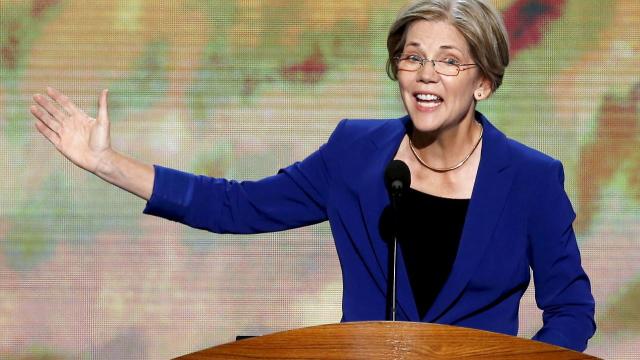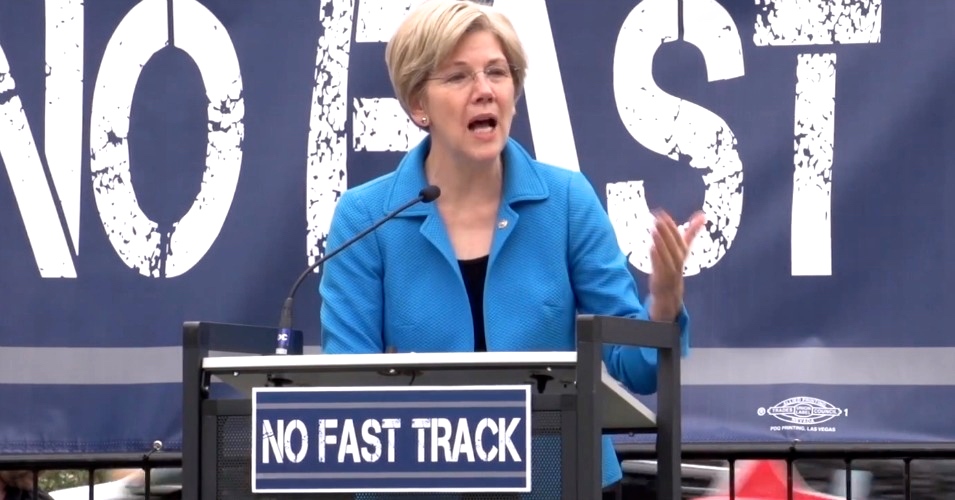
Sen. Elizabeth Warren, the Democratic junior Senator from Massachusetts, warned last week that the investor-state dispute settlement (ISDS or “corporate court”) provisions of the Trans-Pacific Partnership (TPP) will give big, multinational corporations “leverage” to “threaten and intimidate governments that dare take actions that threatens profit.”
Warren was speaking to reporters on a conference call to mark the release of a letter from more than 200 prominent legal and economic scholars (including Obama’s Harvard Law School mentor, Professor Lawrence Tribe) calling on Congress to “protect the rule of law and our nation’s democratic institutions and sovereignty by rejecting this TPP as long as ISDS is included.”
Warren and Legal Scholars Warn About TPP
The ISDS provisions in TPP and other “trade” deals place a corporate tribunal above the legal systems of the countries in the agreement. This empowers multinational corporations to challenge U.S. laws before panels of three private lawyers who can award the companies unlimited taxpayer money based on loss of “expected” profits. It literally replaces U.S. law with the rulings of a corporate tribunal when those laws apply to corporations.
As Warren worded it, this “allows companies to challenge foreign laws they don’t like, with the cases heard by a private panel of arbitrators who are usually corporate attorneys, making rulings that cannot be appealed or reviewed by any court. This will shift power from courts to unaccountable tribunals.”
“Foreign laws” in this use means that non-U.S. companies are empowered to challenge U.S. laws – even if they are corporations set up in, say, Panama by U.S. companies or hedge funds.
Warren and the legal and economic scholars are warning that ISDS provisions overturn the well-established legal systems of developed countries in favor of corporate profits, and is a threat to the rule of law and U.S. democratic institutions.
On the Call
Moderating the call, Lori Wallach, Director of Public Citizen’s Global Trade Watch, said that ISDS “turns the rule of law on its ear.”
Warren and Wallach were joined on the call by:
● Professor Jeffrey D. Sachs, Director of the Earth Institute at Columbia University and a world-renowned professor of economics, leader in sustainable development, senior United Nations adviser, best-selling author and syndicated columnist. (See Roger Hickey’s September 2014 post “Economist Jeffrey Sachs Says NO to the TPP and the TAFTA Trade Treaties.”)
● Professor Cruz Reynoso, professor of law emeritus at the University of California Davis and former associate justice of the California Supreme Court, former vice chair of the U.S. Commission on Civil Rights and member of the Select Commission on Immigration and Human Rights.
● Professor Alan Morrison, associate dean of the George Washington University Law School and Lerner Family Associate Dean for Public Interest & Public Service at George Washington Law School. (Morrison has argued 20 cases before the U.S. Supreme Court.)
On the call, Warren cited a recent BuzzFeed investigative series that revealed, among other things, how hedge funds are making plans to take advantage of ISDS to sue countries for profit.
Warren warned that “ISDS undermines the American judicial system and tilts the playing field further in favor of big multinational corporations.”
Warren discussed some of the cases of ISDS in prior trade agreements like NAFTA (the North American Free Trade Agreement) being used against countries. She noted that Canada was sued and lost in one such “corporate court” for denying a blasting permit on environmental grounds. This ruling cost Canada $300 million, “so what will Canada do the next time a company wants a permit to harm the environment?”
Warren mentioned the Canadian company that is suing the U.S. for $15 billion for not allowing the Keystone pipeline that would move Canadian oil to Gulf Coast ports for shipment to China. She also said the TPP’s “tobacco carve-out” shows what harm corporations can do to us. That negotiators had to add wording to the TPP discouraging tobacco companies from suing governments for trying to protect the health of their citizens shows the kinds of things ISDS would allow corporations to sue for.
Warren closed by saying “giving foreign corporations special rights to challenge laws outside our legal system is a bad idea.”
“Disgrace”
Professor Sachs said that “ISDS is a disgrace.” We already know it will be “gamed by hedge funds” and would let corporations engage in harassment and pressure of governments all over the world, he said. “I don’t know of any advocates of ISDS among legal scholars and economists,” he continued. “There are no advocates other than corporate investors and lobbyists.”
Sachs said it was “absolutely a disgrace for Obama to be pushing this at his last moment. … His own party platform is absolutely explicit on this point. … It could not be more clear.” He said President Obama “is trying to push this through in the dead of night, in a lame-duck Congress, which is the least moment of democratic scrutiny in this country.”
Sachs said Obama is “playing fire with this election.”
“As a Lawyer and Judge, I Feel it Would be a Disaster”
Reynoso explained how ISDS can hurt the laws and practices of legal systems in developed countries.
For example, if California decides to ban fracking, and the state courts and state Supreme Court agree the law is legal, corporations can go to the ISDS tribunal saying such a law hurts their expected profits, Reynoso said.
Saying that “ISDS is a frontal attack on our judicial system,” Reynoso explained the weaknesses in this tribunal system compared to the system of “laws and practices” that have developed over centuries.
“Arbitration is not bound by laws or practices; the decision is final and cannot be appealed, and can’t be used as precedent, Reynoso said. “… It is basically replacing the American judicial system with an arbitration system with these weaknesses.”
“As a lawyer and judge I feel it would be a disaster.”
“Neither Fair Nor Constitutional”
Morrison said he teaches constitutional law with a focus on our separation of powers. He looks at cases where Congress and the president attempt to rearrange our judicial system. “We have a perfectly good system, with our courts and Supreme Court. ISDS turns the whole matter over to private arbitrators. The Constitution doesn’t allow that,” he said.
Morrison pointed out that corporations can even appeal final U.S. court decisions to these corporate arbitrators.
“The ISDS process is neither fair nor constitutional,” he said.
3 WAYS TO SHOW YOUR SUPPORT
- Log in to post comments














Comments
Erik du Fresne replied on
Priorities?
I find it: puzzling to: attempt to: determine: why so many of our nations (so: called) "leaders" have been: squandering so much of their (tax payer: subsidized) time and: energy squabbling over economilegalistic minutuealities while so many millions of us: poor people are: being terrorized by: wave (after: wave) of violent crimes (which are: being perpetrated against us by {predominantly} black criminals? {as: evidenced by the: data describing such [as: elucidated in the following report]}):
http://www.amren.com/the-color-of-crime